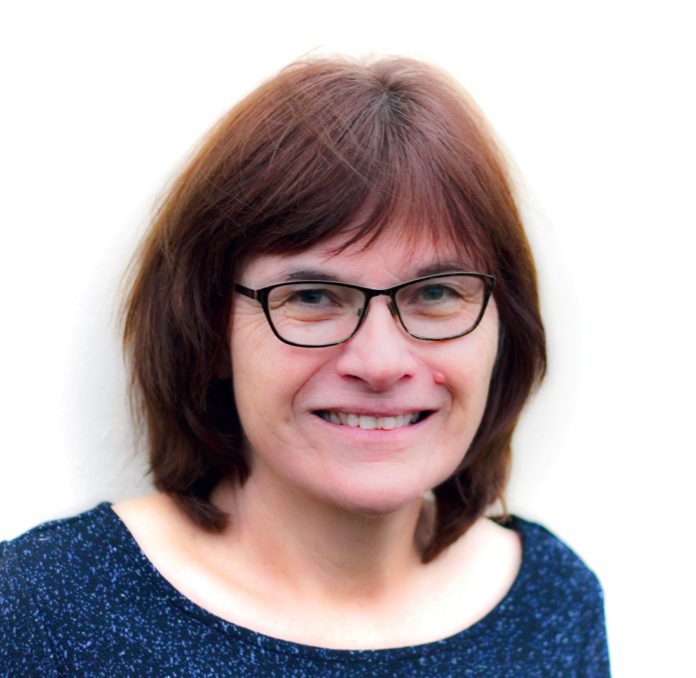Monica Poulter is back in school. So, what has changed in forty years, asks Melanie Butler
We first met on a Diploma course in IH London aeons ago, but most people will know you from your role supporting teacher training qualifications at Cambridge Assessment. What is the biggest change in ELT that you have experienced?
Yes, we first met over 40 years ago and there have certainly been some changes. The main one for me is the huge range of contexts in which the English Language is now taught and learned worldwide.
I dug out my certificate from our Diploma course and the wording shows just how much things have changed! It is described as a course for ‘English nationals’ and the teaching practice was with ‘foreign students’. In 2020, the English Language Teaching profession includes thousands of teachers who learned English as their second language. Many students are learning English in their home country for many different purposes. Others are living, studying and working in an English-speaking country
When we studied for the Diploma, there was still an emphasis on using teaching ‘techniques’ to learn structures, and on mechanical practice of language. There was no reference to developing language skills.
According to my course report, we learned how to use visual aids and the tape recorder! Now, there is an overwhelming number of resources, including digital resources with an increased emphasis on eclectic approaches, and creating individual learning pathways.
The report also said that I had ‘no difficulty in obtaining a grasp of the underlying theories of ELT’ – I don’t think there were so many back then! One of the main challenges for teachers now is that there is so much stuff out there – theoretical and practical. It can be overwhelming.
Recently you have been volunteering as a teacher. How did you get involved?
In my last role at Cambridge Assessment I created an online Futurelearn course to support volunteers working with refugees. In order to produce relevant content. I contacted refugee support organisations and talked to local teachers working with refugees. Then I started teaching myself – the class I am involved with is mostly for women with young children who can’t get to regular classes.
What have you found most challenging about this work?
Very little of my previous teaching experience was with beginners, so for me the most challenging thing has been to work with learners with almost no English, who aren’t familiar with the Roman script and who – in some cases – have had their education interrupted through war and displacement.
Some of the group are highly motivated, but some get very little opportunity to use English outside the class and progress can be slow.
“The most rewarding moments are when there is real communication in the classroom; when participants talk about their home lives or experiences in the UK”
The most rewarding moments are when there is real communication in the classroom; when participants talk about their home lives or their experiences in the UK or when they tell us that they have been, for example, to the pharmacy on their own and have described symptoms to the pharmacist and got medicine for a sick child.
Given your experience teaching refugees what would you add to the Cambridge teacher training framework?
I think I would make more explicit the need to be aware of home languages and cultures. On a number of occasions, I have wished I could speak Arabic – especially when dealing with a personal problem.
There have been moments when a quick explanation in Arabic would have moved the class along by providing background cultural information, explaining language differences between Arabic and English, or setting up a game. On occasion, I have been able to use other volunteers who speak Arabic, which has been invaluable.
If a Celta-trained teacher was thinking about teaching refugees what are the most important things they need to know?
Learn about the linguistic, cultural and educational backgrounds of their group and find out what their current needs are. Check what resources are available to support learning – and find strategies to provide individualised practice and frequent recycling.
Personal qualities are important too. You need empathy and lots of patience. Many refugees are dealing with resettlement issues and family problems – they may not always be in a state where they can focus on your carefully prepared lesson.
What would you like to change about ELT?
What I’d like to see is more recognition for professional development. I think a lot of teachers access training in their own time through following online tutorials and informal networking. It would be great if this could be more formally acknowledged.
I’d like to see increased recognition in three areas – my 3 Ps!
- Professionalisation of ELT
- Professional development pathways for teachers
- Parity between teachers who speak English as a first language and the thousands who don’t
Monica Poulter recently retired after more than 25 years at Cambridge Assessment English, developing qualifications for English language teachers. She is now on the Board of Trustees with the Cambridge Refugee Resettlement Campaign.





